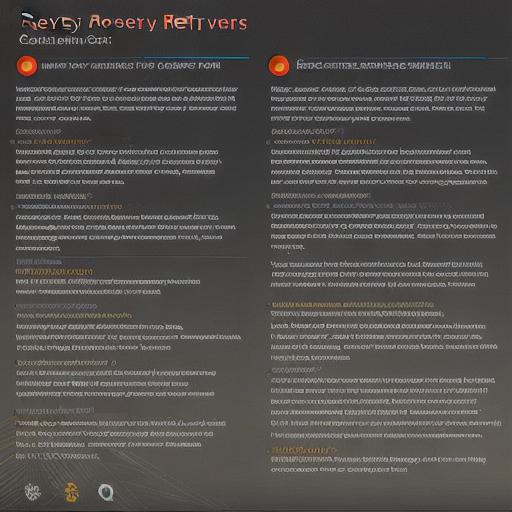As a Unity developer, you are well aware of the importance of having reliable and efficient services that can quickly recover from failures or crashes. In this article, we will explore what Unity Services Recovery is, how it works, and why it’s essential for your Unity projects to be successful. We will also provide some practical tips on how to implement this feature in your Unity games or applications.
What is Unity Services Recovery?
Unity Services Recovery is a set of features designed to help you quickly recover from service failures or crashes in your Unity projects. It is an essential part of the Unity Services package, which also includes other services such as Analytics, Multiplayer, and Cloud Messaging. With Unity Services Recovery, you can quickly detect and resolve issues that may be affecting your game’s performance or user experience.
How Does it Work?

Unity Services Recovery works by monitoring the performance of your game’s services and automatically restoring them in case they fail. It does this by using a combination of techniques such as retry logic, error handling, and fallback mechanisms. The exact process will depend on the specific service that is affected, but in general, Unity Services Recovery will attempt to recover from the failure by retrying the operation or switching to an alternative service if possible.
Benefits of Unity Services Recovery
There are several benefits to using Unity Services Recovery in your Unity projects:
- Improved User Experience: When a service fails, it can lead to a poor user experience for your players or users. With Unity Services Recovery, you can quickly detect and resolve issues that may be affecting the performance of your game, ensuring a seamless experience for your users.
- Increased Reliability: By automatically recovering from service failures, Unity Services Recovery helps to increase the reliability of your game or application. This means that your players or users can rely on your services being available when they need them.
- Reduced Development Time: With Unity Services Recovery, you can save time by automating the process of detecting and resolving service failures. This allows you to focus on other aspects of your project without worrying about the reliability of your game’s services.
- Cost Savings: By reducing the likelihood of service failures, Unity Services Recovery can help to reduce the cost of maintaining and supporting your game or application. This is especially true for larger games with complex services that may require extensive testing and maintenance.
Case Study: Unity Services Recovery in Action

One example of how Unity Services Recovery can be used in practice is in a mobile game that uses cloud-based multiplayer services. If the multiplayer service fails, it could lead to players being unable to connect or play with each other. With Unity Services Recovery, the game’s developers can quickly detect and resolve the issue, ensuring that players can continue to enjoy the game without interruption.
Implementing Unity Services Recovery in Your Project
To implement Unity Services Recovery in your project, you will need to use the Unity Services package, which is available in the Unity Hub. Once you have installed the package, you can enable the recovery features for each of your game’s services by going to the Unity Services settings in the Unity Editor.
For example, if you are using a cloud-based multiplayer service, you would need to enable the recovery feature for that service in the settings. This will allow Unity Services Recovery to automatically detect and recover from any failures or crashes that may affect the multiplayer service.
FAQs
-
What is Unity Services Recovery?
Unity Services Recovery is a set of features designed to help you quickly recover from service failures or crashes in your Unity projects. It is an essential part of the Unity Services package and helps to improve the reliability, user experience, and cost-effectiveness of your game or application.
- How does Unity Services Recovery work?
Unity Services Recovery works by monitoring the performance of your game’s services and automatically restoring them in case they fail. It uses a combination of techniques such as retry logic, error handling, and fallback mechanisms to detect and resolve issues that may be affecting the performance of your game.
- What are the benefits of using Unity Services Recovery?
The benefits of using Unity Services Recovery include improved user experience, increased reliability, reduced development time, and cost savings. By automating the process of detecting and resolving service failures, Unity Services Recovery helps to ensure that your game or application is always available when your users need it. - How can I implement Unity Services Recovery in my project?
To implement Unity Services Recovery in your project, you will need to use the Unity Services package, which is available in the Unity Hub. Once you have installed the package, you can enable the recovery features for each of your game’s services by going to the Unity Services settings in the Unity Editor.
Summary
Unity Services Recovery is a critical component of any Unity project that relies on reliable and efficient services. By automatically detecting and recovering from service failures or crashes, Unity Services Recovery helps to improve the reliability, user experience, and cost-effectiveness of your game or application. With its simple implementation process and range of benefits, Unity Services Recovery is an essential tool for any Unity developer looking to ensure the success of their projects.



